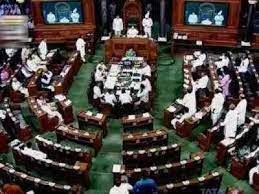Three bills passed in LS, three other introduced amidst Opposition protests
The government on Monday pushed through six bills, three of which were passed, in Lok Sabha despite the unrelenting Opposition protests over Pegasus snooping row and other issues, prompting the Congress to dub it as “murder democracy”.
The bills that were passed amid the din were –The Limited Liability Partnership (Amendment) Bill 2021, The Insurance and Credit Guarantee Corporation (Amendment) Bill 2021 and The Constitution (Scheduled Tribes) Order (Amendment) Bill 2021.
RSP’s NK Premachandran said the three bills were passed in 10 minutes and likened it to “cooking dosas”.
Lok Sabha proceedings were repeatedly disrupted following uproar by the Opposition, but amid the protests, the government also introduced two other bills — The National Commission for Homoeopathy (Amendment) Bill, 2021 and The National Commission for Indian System of Medicine (Amendment) Bill, 2021.
Congress leaders Adhir Ranjan Chowdhury and Manish Tewari alleged that democracy is being “murdered” with the government pushing ahead with its legislative agenda in such a manner when the House was not in order.
When the third bill, The Constitution (One Hundred and Twenty-Seventh Amendment) Bill, 2021 to restore the states’ right to list OBCs, was to be introduced, opposition members vacated the Well of the House and went back to their seats.
When the House met for the day in the morning, Opposition members sought to raise various issues, including the Pegasus spyware controversy and started shouting slogans following which the proceedings were adjourned till 11.30 AM.
When the Question Hour resumed at 11.30 AM, Opposition members trooped into Well.
Rajendra Agrawal, who was in the Chair, asked members to go back to their seats.
“Question Hour is a medium to discuss issues, please participate in this,” Agrawal said.
Soon, he adjourned the House till noon as the opposition ignored his plea and continued their protests.
When the House met again at noon, Agarwal, who was in the chair, allowed papers related to different ministries to be tabled in the House.
